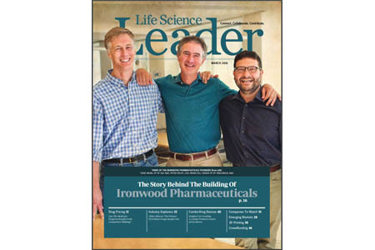Where Are They Now? Ironwood Pharmaceuticals

By Ben Comer, Chief Editor, Life Science Leader

Then: In 2016, when former Life Science Leader editor Rob Wright wrote about cofounder Peter Hecht and Ironwood Pharmaceuticals, the company was ascending. After its initial launch in 1998, the company developed and received approval in 2012 for its first drug, Linzess (linaclotide), indicated for irritable bowel syndrome with constipation (IBS-C) and chronic idiopathic constipation (CIC) in adults. The approval of Linzess appeared to validate Hecht’s strategy for building a pharmaceutical company with a “very long-term focus.” Hecht’s goal, in his telling, was to “build a great pharmaceutical company from scratch and to have it last a couple hundred years.”
To build a company that requires 10- to 15-year product development cycles — the “reality of biotech” at the time, said Hecht — Ironwood instituted policies and practices geared toward bringing in likeminded colleagues focused on the long view. Those practices included a duel-class equity voting structure (giving earlier, long-term investors an upper hand in change-of-control decisions), prioritizing company ownership and milestone-based rewards over salaries in employee compensation packages, and standstill agreements as a mandatory component of partnerships, among others.
Hecht described his earliest meetings with VC funds, prior to company’s initial funding round, as being a little bit too transparent: “One of the firms asked us what our exit strategy was, and I simply said ‘Death.’ Well, he almost got up from the table and walked out of the door!” With additional experience, Hecht said he learned to temper his response to the exit question: “We’re working to build a great company and to earn the right to create returns for our investors. We’ll create on- and off-ramps so that you can get an exit at the right time, but we intend to keep building the business.”
At the time of publication in 2016, Linzess was being taken by nearly one million patients, and the company’s market cap had grown to $1.37 billion. With a second-generation product in the works, as well as potential blockbuster programs in refractory GERD and vascular and fibrotic diseases, and partnerships with Allergan, Astellas, and AstraZeneca, Ironwood was making good on its mission to become a pharmaceutical company built to last.
Now: Although many things have changed at Ironwood in the last eight years, others have remained the same: the company continues to focus on gastrointestinal diseases, and on growing Linzess sales. Ironwood is currently pursuing a rolling NDA (with final submission expected in the first quarter of 2025) for apraglutide, a once-weekly GLP-2 analog targeting short bowel syndrome. Apraglutide arrived via an acquisition of VictivBio in 2023, following Ironwood’s decision in 2020 to end development of its GERD asset, IW-3718, after disappointing Phase 3 trial results — not the blockbuster potential the company had anticipated.
Before that, however, Ironwood split itself into two separate entities in 2019, with the new company, Cyclerion Therapeutics, taking Ironwood’s Soluble Guanylate Cyclase (sGC) early and mid-stage assets for rare diseases. Ironwood CEO Peter Hecht went to Cyclerion as well, as a founder and CEO. By late 2020, however, Cyclerion’s cash position had became untenable, prompting job losses and a pipeline reprioritization focused on development of CY6463 (formerly IW-6463), an sGC stimulator targeting CNS disorders including mitochondrial encephalomyopathy with lactic acidosis and stroke-like episodes (MELAS) syndrome, cognitive impairment in schizophrenia, and Alzheimer’s disease.
By early 2023, it was time to try again. Hecht made an offer to purchase CY6463 (née IW-6463), now called zagociguat, but was rebuffed by Cyclerion’s independent board of directors. After bringing in additional investors and a new offer, Hecht was successful; Tisento Therapeutics launched with Hecht as CEO in July 2023. The company raised $80 million in a Series A round and is focused on the development of zagociguat for MELAS (Tisento also acquired Cyclerion’s preclinical asset CY3018).
Although Hecht is now leading his third company, its lead asset connects back directly to his first company, Ironwood, where it was discovered. Ironwood is now headquartered in downtown Boston (after leaving Cambridge in late 2019), but Cyclerion and Tisento are both located in the same building, on the same floor, in Cambridge. In reading back through Hecht’s comments from 2016 — about his preference for the long view, his willingness to reach out to nearby experts for advice, and his preference for collaborative science — it’s noteworthy that Hecht has managed to navigate the many twists and turns necessary to keep promising assets alive and progressing.
